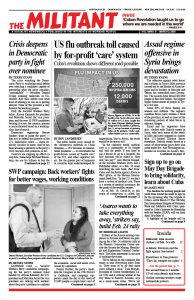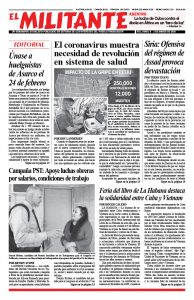HAVANA — The successful effort by Cuban medical volunteers to end the Ebola epidemic in West Africa “was not the work of doctors who were on their own. Behind them was an entire country and a revolution that made this possible,” said Enrique Ubieta.
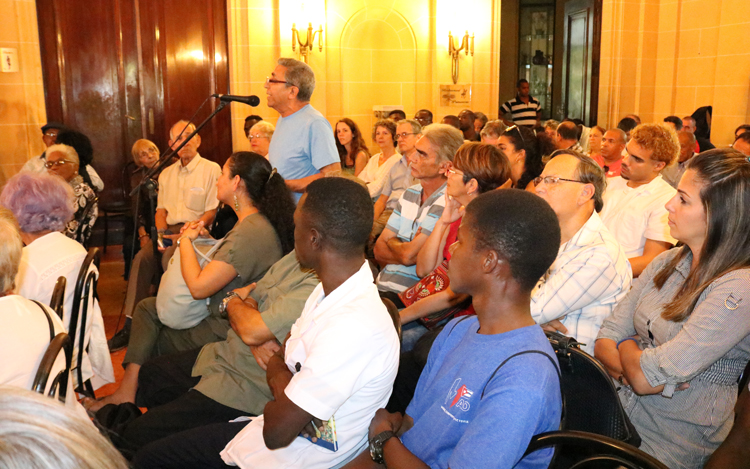
Ubieta was addressing an audience of 100 at a Feb. 10 presentation of his book Red Zone: Cuba and the Battle Against Ebola in West Africa, published by Pathfinder Press in both English and Spanish. The event, part of the Havana International Book Fair, was hosted by the Cuban Institute for Friendship with the Peoples (ICAP).
Based on firsthand reporting, the book tells the story of the internationalist volunteers who helped fight the deadly 2014-15 Ebola outbreak in Guinea, Liberia and Sierra Leone. It’s told largely through accounts by the Cuban participants themselves.
The “red zone” was the special section of the clinics and hospitals where the sickest patients were isolated and cared for.
The panel presenting Red Zone featured Dr. Carlos Castro Baras, who headed the Cuban medical brigade in Guinea. He was joined by Gerardo Hernández, vice rector of Cuba’s Higher Institute for International Relations and known worldwide as one of the “Cuban Five” revolutionaries who spent up to 16 years in U.S. prisons for their actions defending the Cuban Revolution.
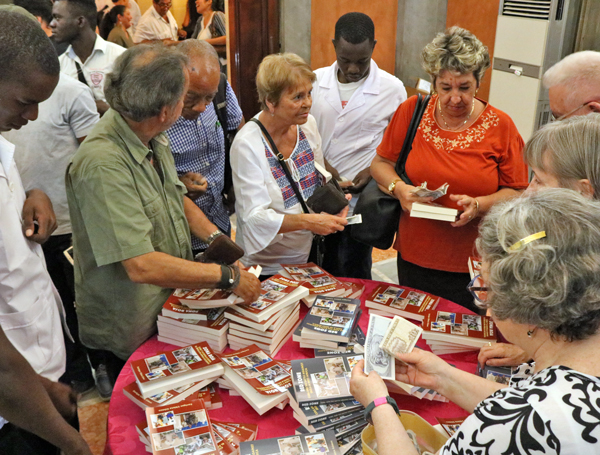
Another featured speaker was Víctor Dreke, president of the Cuba-Africa Friendship Committee, whose life as a revolutionary fighter in Cuba and Africa goes back more than 50 years. Also speaking on the panel was Martín Koppel, Pathfinder editor of the book.
The presence in the audience of numerous other veterans of Cuba’s proletarian internationalist missions added to the spirit of pride that permeated the meeting. Among them were other doctors and nurses who served in the Ebola campaign in West Africa, as well as leaders and other members of the Association of Combatants of the Cuban Revolution. One was Col. Leonardo Tamayo, known by his nom de guerre “Urbano,” who was part of the revolutionary column that fought in Bolivia in 1966-67 under Ernesto Che Guevara. Also present was retired Brig. Gen. Gustavo Chui, who fought in Cuba’s revolutionary war as well as in an internationalist combat mission in Angola.
Product of a socialist revolution
Sandra Ramírez, ICAP’s director for North America, welcomed everyone to the event, which was held at the organization’s Friendship House. Mary-Alice Waters, president of Pathfinder Press and a leader of the U.S. Socialist Workers Party, thanked ICAP for sponsoring and publicizing the book presentation.
“For us, defense of Cuba’s socialist revolution is not only an obligation born of solidarity,” Waters told the audience. “It’s a necessity, inseparable from preparing working people in the United States to emulate the example you have given the world.”
Red Zone “gives a vivid picture of how Cuba’s health care system and working-class internationalism are the product of a deep-going social revolution that transformed millions of men and women,” said Koppel. “It can’t be grafted onto the U.S. or other capitalist countries.”
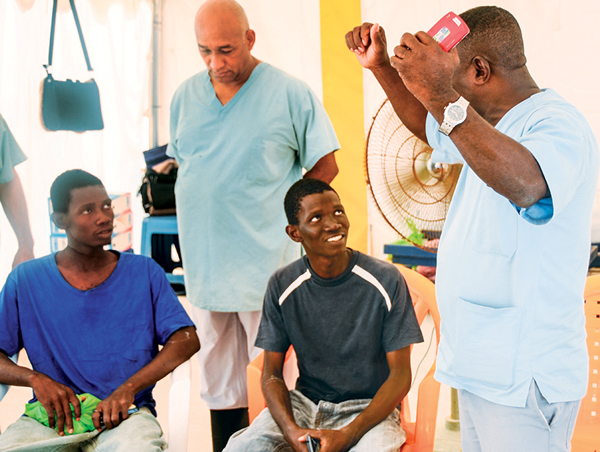
He noted the opportunities to use this book in the U.S. and elsewhere to tell the truth about the Cuban Revolution and refute Washington’s campaign of slanders against Cuba’s medical cooperation abroad — “the bald-faced lie that the Cuban volunteers are victims of exploitation and even ‘human trafficking.’”
That campaign, Koppel said, “is part of the decadeslong economic and political war by the U.S. rulers and their two-faced political party, one Democratic and one Republican, to isolate and strangle the Cuban people.”
Important tool to counter slanders
Pathfinder editor Róger Calero, who chaired the program, introduced Gerardo Hernández, noting that he was one of the first to urge Pathfinder to publish Red Zone, in both English and Spanish, to reach a broader audience outside Cuba. Ubieta’s account of the Ebola mission was first published by Casa Editora Abril, the publishing house of Cuba’s Union of Young Communists.
Hernández saluted the volunteers who waged the fight against the killer disease. “This book is about heroes,” he said. “Not heroes created in a laboratory, but those who were ready to give their lives on behalf of others — who were educated by the revolution.
“It’s not accidental that today these doctors are a target of imperialism’s campaign against Cuba,” he said. “This book is an important tool to counteract that campaign.”
Hernández himself was one of the 425,000 Cuban volunteers who, from 1975 to 1991, served in Angola to defend it from invasions by the South African apartheid regime.
He also spoke of how he had used books published by Pathfinder while the five revolutionaries were locked up on frame-up charges in U.S. federal prisons. “During much of the 16 years we were in prison, the compañeros of Pathfinder and the Socialist Workers Party sent us books, as well as the Militant,” he said.
Hernández told the audience, “When I saw all the books displayed on the table at this meeting, I recognized how many of them had been in my cell. The same was true of my four brothers.”
After all five had won their release and returned to Cuba by December 2014, Hernández said, “most of those books remained in the prisons, educating others.” He passed on all his contacts to Pathfinder, “and to this day they keep sending them the Militant and books, which are circulated from hand to hand in the U.S. prisons.”
One of those interviewed by Ubieta for Red Zone was Víctor Dreke, whose revolutionary record in Africa began in 1965 when he served as second in command under Ernesto Che Guevara of Cuban combatants supporting liberation fighters in the Congo.
When talking about the medical personnel who went to fight Ebola in West Africa, he said, “We should recall that in 1966-67 there were also Cuban doctors in that region, both combating diseases and fighting arms in hand.”
Dreke also headed Cuba’s military mission in Guinea-Bissau, supporting the national liberation movement led by Amilcar Cabral in the war for independence against Portugal. In addition, the Cubans gave military assistance to neighboring Guinea, whose government, led by Ahmed Sékou Touré, faced Portuguese attacks for its support to Guinea-Bissau’s independence fighters.
Washington’s “attacks on the Cuban doctors today are outrageous,” said Dreke. “They’re threatening the lives of African children when they try to expel doctors from places where often there are no other doctors. We can’t keep quiet about this. We won’t use swear words — but we have to say they’re shameless scoundrels!”
‘We’re ready to do this again’
“I don’t consider that we’re heroes,” said Dr. Castro Baras. “We’re health workers. The revolution has taught us we have to go wherever we’re needed, whether in Cuba or abroad.” And “if some day we have to return to fight Ebola or whatever, we’ll be there.”
The Cuban doctors and nurses fought to save the life of every single patient in their care. And Castro Baras, as head of the Cuban brigade in Guinea, was responsible for the lives and well-being of the 38 medical volunteers under his direction. “This experience made me a better person,” he said. “You learn not just to think about yourself.” You learn how to work together with others under life-and-death conditions. “We held high the name of Cuba in the world.”
A book by Castro Baras, Vivir siempre el día 21: cara a cara contra el ébola, was launched at the book fair the following day. The title, “Always living through Day 21: Face to face with Ebola,” refers to the 21-day incubation period for the disease and how the medical personnel faced the constant uncertainty of whether they had been infected throughout the months they served in West Africa.
Ubieta took up Castro Baras’ remark that he had returned from the Ebola mission a better person. “People ask me, ‘What does Cuba gain from its acts of internationalist collaboration?’ I always answer, ‘The Cubans who go become better people.’ What bigger gain is there?” It’s made possible by a socialist revolution, by “people forged by different social relations.”
Despite concern for the lives of the volunteers, the West Africa mission was extremely popular and a source of pride among Cubans. “It shows that the seeds of solidarity are alive in Cuban society today,” Ubieta emphasized.
The author thanked Catriona Goss, who was at the meeting, for her careful work translating Red Zone to English. He noted that a French-language edition, translated and printed by friends of the Cuban Revolution in France, has also just been published under the imprint of Abril.
Long record of internationalism
Following the presentations a number of audience members took the floor. José Gárciga, a retired lieutenant colonel of Cuba’s Revolutionary Armed Forces who fought in Angola, described how Cuban military doctors there cared for civilians as well as Angolan, Cuban and even enemy combatants. “It’s an example of our internationalism,” he said.
Dr. Iván Mora, director of Havana’s psychiatric hospital, who previously took part in medical missions in Nicaragua and Venezuela, noted that the internationalist record of the Cuban Revolution goes back to May 1960 when the new revolutionary government sent a volunteer medical brigade to Chile following an earthquake there.
With the battle against Ebola, “the whole world learned about what Cuban doctors are doing,” and that’s why they’ve become a special target of Washington, he said.
Dr. Jorge Delgado, who headed Cuba’s medical brigade in Sierra Leone, the largest of its three anti-Ebola contingents in West Africa, also spoke. In response to the Ebola outbreak, he asked, “What did the U.S. give? Money. What did France give? Money — to its former colony in Guinea. What did the British give their former colony in Sierra Leone? Money.” In contrast, he said, Cuba sent what was most needed — more than 250 medical personnel.
“The doctors are Cuba’s best ambassadors,” said Rob Miller, director of the Cuba Solidarity Campaign in the United Kingdom. “This book is very important” in telling the truth about Cuba’s example,” he said, thanking Pathfinder for publishing it.
“We can never forget the army in white coats that Fidel sent to our continent,” said Evrard Carlin, a fourth-year medical student from the Republic of the Congo, also known as Congo-Brazzaville. Carlin was one of 10 African medical students — from Chad and the Congo — who took part in the meeting. Over the decades Cuba’s revolutionary government has provided free medical training to tens of thousands of youth from countries in Africa, Latin America and elsewhere.
After the program, participants bought dozens of copies of Red Zone, or Zona Roja, as the Spanish version is called. They also picked up other titles published by Pathfinder on the Cuban Revolution and subjects ranging from working-class politics in the U.S. to speeches by Thomas Sankara, leader of the 1983-87 revolution in the West African country of Burkina Faso — in Spanish, English and French.
Prensa Latina and other Cuban news agencies reported on the presentation of Red Zone, and ICAP posted an article on its website. Cuban TV featured it in a 10-minute news segment the following day.
